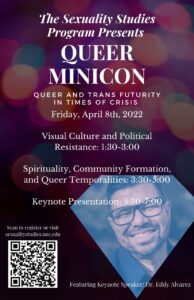 Join us for this year’s Queer MiniCon centering themes of futurity and resilience in times of crisis.
Join us for this year’s Queer MiniCon centering themes of futurity and resilience in times of crisis.
This year’s Queer MiniCon will be a one-day virtual conference showcasing outstanding UNC undergraduate and graduate research in queer studies during the afternoon of April 8th. It will consist of two panels (one graduate and one undergraduate) with four 15 minute paper presentations and a keynote address.
Additionally, we are pleased to announce that Chicanx and Jotería Studies scholar Dr. Eddy Alvarez Jr. (Dept. of Chicana/o Studies, Cal State University Fullerton) will be this year’s keynote speaker. After the undergraduate and graduate panels, Dr. Alvarez will present some of his scholarly and creative works followed by a Q&A session.
Run of Show:
Visual Culture and Political Resistance: 1:30-3:00
Spirituality, Community Formation, and Queer Temporalities: 3:30-5:00
Keynote Address: 5:30-7:00
“Queerness is essentially about the rejection of a here and now and an insistence on potentiality or concrete possibility for another world” – José Esteban Muñoz Cruising Utopia: The Then and There and Queer Futurity pp. 1
Queer theorists have long-held investments in futurity and resilience. In this time of global social, political, environmental, and epidemiological crises, how we imagine alternative destinies is more vital than ever. In Feminist, Queer, Crip, Alison Kafer writes that “the futures we imagine reveal the biases of the present; it seems entirely possible that imagining different futures and temporalities might help us see, and do, the present differently” (28). As such, we invite abstracts for this year’s Queer MiniCon on all matter of queer and trans studies research. We invite presenters to consider: What do imagined futures reveal about the present? How do crises re-animate, disrupt, or erupt the public sphere? How can we draw from past queer and trans ways of being and knowing to address our current time of crisis? What innovative epistemologies can arise from times of crisis? What is the future of queer and trans studies?
